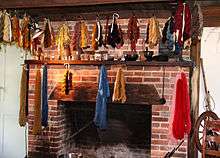Definify.com
Webster 1913 Edition
Dye
Dye
(dī)
, Verb.
T.
[
imp. & p. p.
Dyed
(dīd)
; p. pr. & vb. n.
Dyeing
.] [OE.
deyan
, dyen
, AS. deágian
.] To stain; to color; to give a new and permanent color to, as by the application of dyestuffs.
Cloth to be
dyed
of divers colors. Trench.
The soul is
dyed
by its thoughts. Lubbock.
To dye in the grain
,
To dye in the wool
Fig.
), to dye firmly; to imbue thoroughly.
He might truly be termed a legitimate son of the revenue system
dyed in the wool
. Hawthorne.
Syn. – See
Stain
. Dye
,Noun.
1.
Color produced by dyeing.
2.
Material used for dyeing; a dyestuff.
Webster 1828 Edition
Dye
DYE
,Verb.
T.
To stain; to color; to give a new and permanent color to; applied particularly to cloth or the materials of cloth, as wool, cotton, silk and linen; also to hats, leather, &c. It usually expresses more or a deeper color than tinge.
Definition 2025
dye
dye
See also: d'ye
English
Noun
dye (countable and uncountable, plural dyes)
Synonyms
See also
Translations
a colourant, especially one that has an affinity to the substrate to which it is applied
|
|
Verb
dye (third-person singular simple present dyes, present participle dyeing or dying, simple past and past participle dyed)
- (transitive) to colour with dye
Synonyms
Translations
to colour with dye
|
|
Derived terms
Terms derived from "dye"
Etymology 2
Noun
dye (plural dice)
- Alternative spelling of die
- 1748. David Hume. Enquiries concerning the human understanding and concerning the principles of moral. London: Oxford University Press, 1973. § 46.
- If a dye were marked with one figure or number of spots on four sides, and with another figure or number of spots on the two remaining sides, it would be more probable, that the former would turn up than the latter;
- 1748. David Hume. Enquiries concerning the human understanding and concerning the principles of moral. London: Oxford University Press, 1973. § 46.
Translations
die — see die
